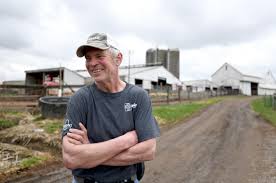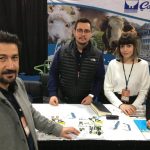
NIMISHILLEN TWP. Before Lela Raber’s death in 2008, her son, Dwight, promised her he’d keep the family’s fourth-generation dairy farm running for at least 10 more years.
He kept his word.
But times have changed.
“I’ve got to make $16 (per 100 pounds, or 11.6 gallons of milk) just to break even,” Dwight Raber said in a folksy drawl, as he turned the pages on a printed report that details daily production of the farm’s 235 cows. “Right now, I’m at $13.89 and it’s been that way for two years.”
Raber’s laid-back tone belies what he’s felt inside the past few years.
The stress was catching up to him and he was hospitalized with blood clots last summer. He’s accustomed to long hours of waking up to work at 4:15 a.m. and quitting at sunset, but that lifestyle has become ever more grueling now that he’s 58 years old.
“He has poured his heart into this farm,” said Raber’s wife, Julia, an English teacher at East Canton High School. “He just goes and goes, 24/7. But it’s time to slow down; it really is. His mother also told him, ‘Please don’t ruin your health.’”
***
The dairy business has changed.
It’s tougher than ever.
Several years ago, Raber added beef cattle to the farm to supplement the dairy portion. After agonizing for more than a year, Raber has come to the conclusion that it’s time to quit milking cows — he just can’t make a living at it anymore.
He could have held out longer, though he decided it wasn’t worth the risk of a larger financial hole.
So, at 10 a.m. Wednesday, Raber will sell his herd of dairy cows and much of the equipment he’s accumulated through the years. Kiko Auctions will handle the auction.
The same story is playing out at an ever-increasing pace across the state. In January 2017, there were 2,647 dairy farms in Ohio, compared to 2,045 by January of this year, according to license statistics from the Ohio Department of Agriculture.
Besides the Holstein cows, the Raber sale includes a Jaguar chopper, a six-row folding rotary corn head, a silage table, skid loader, trucks, a tractor, tandem twin manure spreader, disc, hay baler, cultivator, a computerized calf-feeder, milking units and a 3,000-gallon bulk tank, which held milk until it was trucked away daily.
***
“I’m a little scared,” Raber admitted.
All he’s known is being a dairy farmer. He and his brother, Bruce, who died in 2007, grew up working the farm. So did his father, Russell. Same for his grandfather, Ernest. And his great-grandfather, Albert, who founded the farm after he came to the U.S. from Schangnau, Switzerland, in 1891, and changed the family’s surname from ‘Reber’ to ‘Raber’ because he grew tired of hearing it mispronounced.
Over the years, the farm grew to its present 500 acres, some on each side of State Street NE.
Dwight and Julia Raber live in a house on the north side of the street. One of their sons, Alan, lives in the old farmhouse, on the south side, near the barns and milking parlor. And Bruce Raber’s widow lives in another house on the property.
Dwight and Julia Raber’s two natural-born sons, Alan and Scott, helped for years on the farm. But ultimately, they chose other careers: Alan is a Stark County Sheriff’s deputy and Scott manages Titan Machinery stores in Nebraska.
“We never tried to push them into farming,” Dwight Raber said. “We let them find their way … I remember when I was a kid, I played sports in high school. And after the games, my friends would say they were going home to sleep or do whatever. But I’d just go home and work for four hours. It’s just what we did.”
Dwight and Julia Raber have three more sons — all adopted as young boys from Russian orphanages. They are Aaron, 20, Isaac, 18, and 15-year-old Austin.
***
A faded “Raber Dairy Farms” sign along State Street NE will soon be replaced with one that drops ‘Dairy’ from the title. Dwight Raber plans to grow his beef herd and to plant and sell crops — in the past, all the crops had to be used for feed.
“It’s going to be a lifestyle change for the better for him,” said Debbie Hajba, one of Dwight’s two sisters, who grew up on the farm before marrying and moving out.
Dairy cows get milked twice a day. They’re also particular about their feed. Their mix has be consistent and exact, in order for them to produce milk at a high level.
Beef cattle are less high-maintenance. Raber said he’ll take advantage of his extra time to tidy up the property and pay more attention to aesthetics, as his mom and grandmother did.
“This was a showplace; I want to return it to that,” he said.
Raber smiled and shook his head, as he walked by a series of cow hoof indentations in the wet grass near the farmhouse — evidence of a recent “jail break” by some in the herd.
Pardon the pun, but his mom would have had a cow if her manicured lawn wasn’t repaired within five minutes of the occurrence of such an unacceptable event.
***
Ohio has lost another 51 dairy farms already this year, slicing the statewide number to 1,994.
“The trend is alarming,” said Dianne Shoemaker, an Ohio State University Extension Field Specialist in dairy product economics. “It’s … not the way I’d like to see the dairy industry going.”
She said the business has changed dramatically in the past 25 years. Profit margins are smaller and smaller, which often requires farms to get even larger to survive. Shoemaker said about 17 percent of the milk produced in the U.S. is exported.
“There’s a lot of milk out there,” she said. “Back in grandfather’s day, the milk prices were local. Now they are global … or they are at least influenced on a global level.”
Dairy farmers enjoyed a boom year in 2014, but it’s been bad four years in a row, Shoemaker said. She added the plight of Ohio farmers is partly due to a glut of milk coming into the state from mega-farms in Michigan — often at less than market rate.
***
Dwight Raber said he’s felt the pressure. In his younger days, a cow that produced 100 pounds of milk a day was a herd superstar. These days, that’s almost the average.
“We’ve been so blessed for so long, and with our wonderful sons … but it’s time,” Julia Raber said of the upcoming auction. “There’s such a beauty about the land. It’s spiritual.”
After Dwight’s mom, Lela, died a decade ago, her ashes were scattered in a small garden she tended behind the farmhouse. A plaque marks the location. Julia Raber is sure Lela, the matriarch who’d kept the farm going for so long, would understand and approve of the auction.
After all, the Rabers still have the farm, even if it will change.

























